Grand Tour Doubles - Fausto Coppi
The latest race content, interviews, features, reviews and expert buying guides, direct to your inbox!
You are now subscribed
Your newsletter sign-up was successful
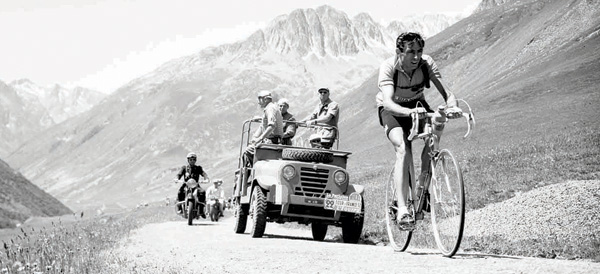
Fausto Coppi’s legend was created as much by the florid language of the newspaper journalists and the radio broadcasters of the day as the legs and lungs of the man himself.
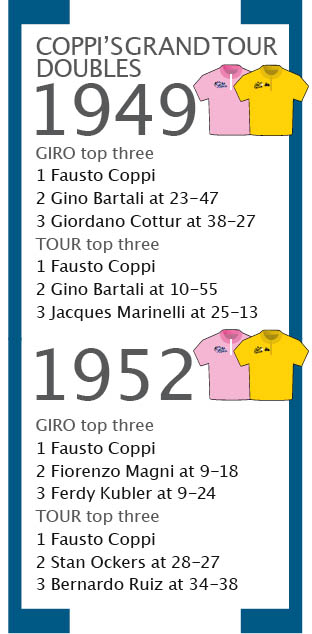
That is not to say that Coppi was not an awesome man, of course he was, the first modern champion and first to win the Giro and the Tour in the same year.
But almost all his fans learned of his feats by listening to the commentary on the radio and reading the accounts in the sports papers.
And Italians, being Italians, embroidered and gilded their stories, making Coppi a hero at home. Not that there wasn’t an abundance of material with which to create such dramatic pictures.
When Coppi decided it was time to ride, he rode as if that mountain stage was to be his last. He rode at a relentless pace and put minutes into his opponents, often winning a tour with one devastating attack spanning four or five mountains.
Imagine what the factory workers and housewives listening on the radio must have made of that; to hear in every update throughout an eight-hour stage that Coppi was still clear, and stretching his lead.
In post-war Italy, there were in fact two heroes, Coppi and Gino Bartali, but Coppi was the man with all the glamour. When he won the Giro, the ever-demanding tifosi told Coppi he must win the Tour. And when he won them back to back during the same summer, he had become the stuff of legend.
The latest race content, interviews, features, reviews and expert buying guides, direct to your inbox!
They said it would never be done again, that victory in both epic stage races in the same year was impossible. But Coppi repeated the feat in 1952.
In 1949, Coppi beat Bartali twice, each time with devastating attacks. During the Tour the pair were on the same Italian team, although in truth there were divisions within it. Each rider had those he trusted and those he didn’t, but in the end it fell to Alfredo Binda, the team manager, to make the call, allowing Coppi to ride on when Bartali crashed in the Alps.
By 1952 Coppi had virtually no rivals who could touch him when he was in his best form. He won the Tour by a staggering 28 minutes and was totally untouchable not only in the mountains but also in the long time trials.
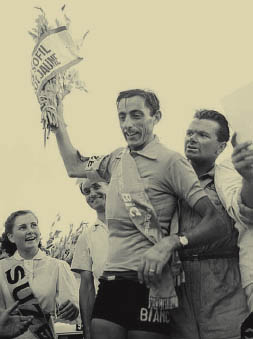
GRAND TOUR CLINCHERS - 4 KEY STAGES
1) 1949 Giro d’Italia Stage 17, Cuneo-Pinerolo
Coppi attacks on the Maddalena, the first of five huge mountain passes, to wipe out his deficit overall, claim the pink jersey and put more than 11 minutes into Gino Bartali. It is a trademark of Coppi’s riding style, to pedal away from the rest and keep on going, never letting up, never pausing for thought.
2) 1949 Tour de France Stage 16, Cannes-Briancon
Coppi and Bartali are team-mates —or at least they are in the same Italian team, managed by Alfredo Binda. But both want to win and know they have to ride against one another to do so. On this mammoth 275-kilometre stage from the south coast to the highest large town in the Alps, Coppi breaks away only for Bartali to go with him. Coppi gets a puncture, Bartali waits. Later on, Bartali punctures and Coppi waits. They ride together to the finish, attempting to drop each other but unable to do so. Bartali wins the stage in a time of 10 hours 25 minutes.
3) 1949 Tour de France Stage 17, Briancon-Aosta
The very next day in the same Tour, the stage finishes in Italy and will crown the overall Tour champion. Bartali leads by 1-22 overall and the pair attack once again. And once again Bartali gets a puncture and Coppi waits for him. But then Bartali crashes, injuring his foot.
Binda cuts Coppi free, allowing him to ride for himself. By the finish he is 4-53 up on Bartali who, though hurt, is still able to finish second on the stage.
4) 1952 Tour de France stage 10, Lausanne-Alpe d’Huez
Although Coppi’s performance on stage 11 to Sestriere was more impressive, this stage is a landmark in Tour history. It was the first stage to finish at the summit of a mountain. Coppi wins on Alpe d’Huez by 1-20 to take the yellow jersey by a five-second margin. Next day he slaughters the field, crossing the Croix de Fer, Galibier and Montgenèvre in first place to win at Sestriere by seven minutes and put the Tour beyond doubt.
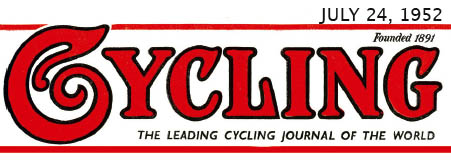
Arriving at Toulouse, with 16 of the 22 stages covered, and with a substantial lead of 25 minutes in the general classification, the intentions of Fausto Coppi in the Pyrenees could not easily be defined.
Would he seek to increase his lead; to assert his proved superiority as a ‘grimpeur’ yet again so as to remove any possibility of his advantage being whittled away, perhaps by a fall, a sudden indisposition (such as he encountered in this area last year) or a resolute attack by combined French and Belgian forces? Would he be content to keep near the leaders on the steep roads, ready to match or neutralise any serious attacks by the closest riders?
Or, finally, would he be content to rest upon the laurels he gained in the Alps and accept the indications that Ockers and Bartali were not sufficiently strong to pull back their deficits?
On the stage to Pau, here was Coppi, once again the master roadman, not only back to his 1949 form, but in fact even better. Confident, calm and completely sure of himself, he dominated the stage.
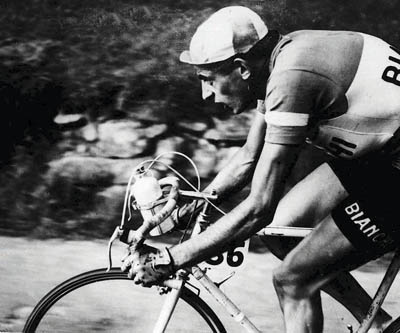
The facts speak for themselves: Col du Tourmalet — Coppi. Col d’Aubisque — Coppi. Stage finish — Coppi.
Yet the figures do not tell of the ease with which Coppi held his advantage; of his tantalizing backward glances at his followers as if to say, “Catch me if you can.”
Nor do they tell of the extremes of conditions that the riders encountered on the Tourmalet and Aubisque passes; of the agonies suffered by those who wished to maintain the pace set by the yellow-jerseyed race leader at the front.
The descent of the Aubisque will long be remembered. The mist was even thicker than on the Tourmalet, and the road was streaming with water. To keep going down that narrow winding road in a car was an unnerving experience, but it could not compare with the strain imposed on the Tour riders whose brakes could not act efficiently on soaking rims and who had a very uncertain stability on the gravel-strewn road, which in places had several feet of its already narrow width fallen away into the void below.
At the front, Coppi led the way. Then, as a final gesture, when only 300 yards away from the finish, he went away again, to win the stage (and a further minute allowance) by three seconds.
Recommended Reading
Grand Tour Doubles - Introduction
Grand Tour Doubles - Fausto Coppi
Grand Tour Doubles - Jacques Anquetil
Grand Tour Doubles - Eddy Merckx
Grand Tour Doubles - Bernard Hinault
Grand Tour Doubles - Giovanni Battaglin
Grand Tour Doubles - Stephen Roche
Grand Tour Doubles - Miguel Indurain
Grand Tour Doubles - Marco Pantani
Grand Tour Doubles - Alberto Contador